Malia Bouattia has been elected as the new President of the National Union of Students (NUS), during Last week’s NUS National Conference in Brighton where allegations of antisemitism took centre-stage.
Delegates from universities across Britain voted for Bouattia as their new President after a close contest in which she defeated incumbent Megan Dunn. Ms Bouattia has been NUS black students’ officer for the past two years and ran on a radical grassroots platform, opposing the government’s anti-radicalisation Prevent strategy, and pledging to renew NUS activism. She will be the first black woman Muslim President.
Ms Bouattia is a controversial choice, winning the election despite an open letter signed by over 57 heads of Jewish societies from across the United Kingdom, asking her to explain her “extremely concerning rhetoric”.
She spoke against an NUS motion “to condemn the IS and support Kurdish forces fighting against it, while expressing no confidence or trust in US military intervention. She objects to the wording of the motion, instead issuing her own statement expressing solidarity with the Kurds against Islamic State and condemning the group’s “brutal actions”.
The signatories of the open letter asked why she referred to the University of Birmingham as “something of a Zionist outpost in British higher education” in a 2011 article. Ms Bouattia is also alleged to have claimed at a 2016 meeting hosted by London University’s School of Oriental and African Studies that the government’s controversial anti-extremism policy, Prevent, was created by “all manner of Zionist and neo-con lobbies”.
The signatories of the letter were worried that Ms Bouattia appeared to accept the endorsement of a spokesperson for the Muslim Public Affairs Committee UK, an organisation which has been no-platformed by the NUS since 2004 for propagating the idea of a worldwide Zionist conspiracy and re-posting articles from neo-Nazi and Holocaust Denial websites. Upon receiving the message of support from the controversial group’s representative, Ms Bouattia replied simply: “Thank you :-))”.
Despite this, three of Sussex’s four delegates to NUS Conference publicly supported Ms Bouattia.
Days before the NUS election, Ms Bouattia released a statement in which she said: “I am deeply concerned that my faith and political views are being misconstrued and used as an opportunity to falsely accuse me of antisemitism, despite my work and dedication to liberation, equality and inclusion.
“I am alarmed that you have drawn a link between criticism of Zionist ideologies and anti-Semitism.”
Regarding the alleged link with the Muslim Public Affairs Committee UK, she said: “I do not have a relationship, in any shape or form, with this organisation or the individual in question [Raza Nadim]. I have always and will continue to respect and uphold NUS’ No Platform Policy.”
In her hustings speech Ms Bouattia said that she had come to Britain at age 7 as a refugee from the Algerian Civil War: “You will read in the media that I am a terrorist, that my politics are born form hate,”
“How wrong that is. I have seen terrorism and suffered from it. I know too well the harms done by racism and persecution. I suffered it every day.”
She also outlined the changes she wants to make within the NUS: “this Conference has to be about society,” she said, arguing for the need to “talk about liberation for parents, LGBTQ+ people, migrants, workers… Not just students”.
The issue of antisemitism and anti-zionism was also raised at Conference in relation to Motion 404, titled “antisemitism on campus.” The delegate who spoke proposing it said “it is vital that we tackle anti-Semitism head on”.
The motion would “recognise the issues the NUS itself has and resolve those, accept an internationally established definition of anti-Semitism and support individual student unions to better handle incidents.”
An amendment to the motion arguing that the NUS should commemorate Holocaust Memorial Day sparked debate over the definition of antisemitism.
Several students spoke against the amendment, with one Jewish student standing up to criticise the definition of antisemitism given: “It conflates antisemitism and anti-zionism and makes it impossible to criticise the state of Israel,” she said, pointing out that the same definition had been discarded by the European Union in 2013.
The NUS’s working definition of antisemitism says: “Antisemitism is a certain perception of Jews, which may be expressed as hatred toward Jews. Rhetorical and physical manifestations of antisemitism are directed toward Jewish or non-Jewish individuals and/or their property, toward Jewish community institutions and religious facilities.
“In addition, such manifestations could also target the state of Israel, conceived as a Jewish collectivity.”
A number of students also took the floor to argue against commemorating Holocaust Memorial Day. One said that it is wrong to “commemorate just one mass genocide” and “forget others like Tibet and Zanzibar” since this gives the impression that “some lives are more important than others.”
Conference eventually voted to uphold the current definition of antisemitism and to celebrate Holocaust Memorial Day. A substantial proportion of delegates abstained.
In the wake of these two controversies, campaigns have started at several universities to disaffiliate from the NUS.
Cambridge have launched a campaign in direct response to the election of Ms Bouattia, according to The Independent, and eight political societies at the University of York have launched a campaign to disaffiliate from the NUS.
Freya Marshall Payne

